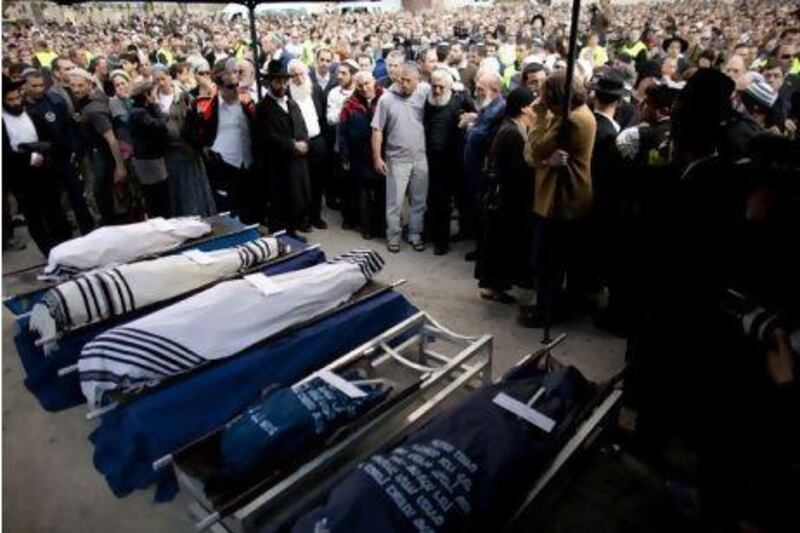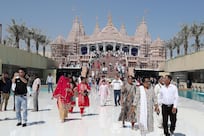NAZARETH // Israel announced plans yesterday to build 500 settler homes after the fatal stabbing of five members of a settler family in a Jewish settlement at the weekend.
The attack on Friday night, the deadliest against a settlement for many years, horrified Israelis and unleashed revenge attacks by settlers on Palestinians.
The Israeli government's plan to expand four of the West Bank's largest settlements was agreed at an emergency meeting of ministers on Saturday night.
The new construction includes two settlements, Maale Adumim and Ariel, that have been major obstacles to a peace agreement between Israel and the Palestinians in past talks.
Nabil Abu Rudeineh, a spokesman for Mahmoud Abbas, the president of the Palestinian Authority, said the "atmosphere this decision creates isn't helpful, it creates problems, and peace needs courageous decisions".
Since Israel ended a partial freeze on settlement-building last September, Benjamin Netanyahu, the Israeli prime minister, has sought to slow down the pace of construction to avoid a confrontation with the United States.
The US wants the freeze renewed to kick-start stalled talks with the Palestinians.
Israel's new plan comes less than a month after the US was forced to use its veto to block a Palestinian resolution, backed by the rest of the UN Security Council, condemning the West Bank settlements.
Hillary Clinton, the US secretary of state, had earlier described as "an inhuman crime" the killing of three children, including a three-month-old baby, and their parents, Udi and Ruth Fogel, in their beds.The Quartet, the international group overseeing the peace process, also denounced the attack.
At a full cabinet meeting yesterday, Mr Netanyahu's coalition partners pushed for a tougher response. Eli Yishai, the leader of the religious party Shas, called for "at least a thousand new settler homes for each person murdered".
It was not immediately clear what the implications were for a peace initiative that, according to Mr Netanyahu's officials, he is due to unveil in the coming weeks.
As the bodies of the family were buried in Jerusalem yesterday in a funeral attended by 20,000 mourners, Ehud Barak, the defence minister, said the "iron fist" of the Israeli security services would "quickly land on the murderers".
The Israeli army continued its hunt for the intruders who breached the security fence around Itamar, a settlement of 160 religious families deep in the West Bank and close to the Palestinian city of Nablus.
The settlement, like more than 200 others in the West Bank and East Jerusalem, was built in violation of international law.
Yesterday, Israeli officials discounted a claim of responsibility from a fringe Palestinian group called the Imad Mughniyeh Brigade.
Residents of Itamar have regularly clashed with neighbouring Palestinian villages as the settlers extended their control over territory in the area.
Israeli soldiers were reported to have rounded up at least 20 men from Awarta, next to Itamar, as the village was placed under curfew.
In a sign of rapidly deteriorating relations with the Palestinian Authority, the Israeli army refused to co-ordinate its manhunt with Palestinian security services.
There has been a significant increase in violence between settlers and Palestinians across the West Bank. Ten Palestinians and a settler were injured during clashes this month near Nablus.
It was widely expected that the settlers would quickly retaliate for the killings with their so-called "price-tag" policy.
Israeli security forces were deployed in large numbers over the weekend in potential friction points, especially around the extremist settlements near Nablus and Hebron.
Even before the Itamar attack, the settlers had announced a series of "days of rage" to protest against the threatened demolition of homes in small settlements Israel has not authorised.
Israeli officials were reported to be worried that escalating violence from the settlers might trigger large-scale Palestinian protests, similar to those taking place elsewhere in the region, that could destabilise the PA.
According to Maan, a news agency based in the occupied territories, settlers attacked Palestinian villages across the West Bank over the weekend. Palestinian cars were stoned on several main roads, especially near Hebron.
Amal Jamal, a politics professor at Tel Aviv University, said the government's announcement of more settlement-building highlighted the degree to which the settlers controlled the government's agenda.
"It looks suspiciously as though Netanyahu was waiting for something tragic like this to justify doing what he wants to do anyway, which is to expand the settlements."
Roni Ben Efrat, a long-time Israeli analyst, accused Mr Netanyahu of "milking world sympathy" to promote the settlements. She said the killings in Itamar underlined not the need to strengthen the settlements, as Mr Netanyahu suggested, but "the lack of will from successive governments to remove the settlers" from their homes.
At the cabinet meeting yesterday Mr Netanyahu accused the PA of directly inciting the killings. "The Palestinian Authority grants scholarships to the families of murderers and names squares in their honour. This does not show the PA is educating toward peace."
He called Mr Abbas on Saturday to tell him that his denunciation of the Itamar attack was inadequate. Mr Abbas had condemned "all violence directed against civilians".






